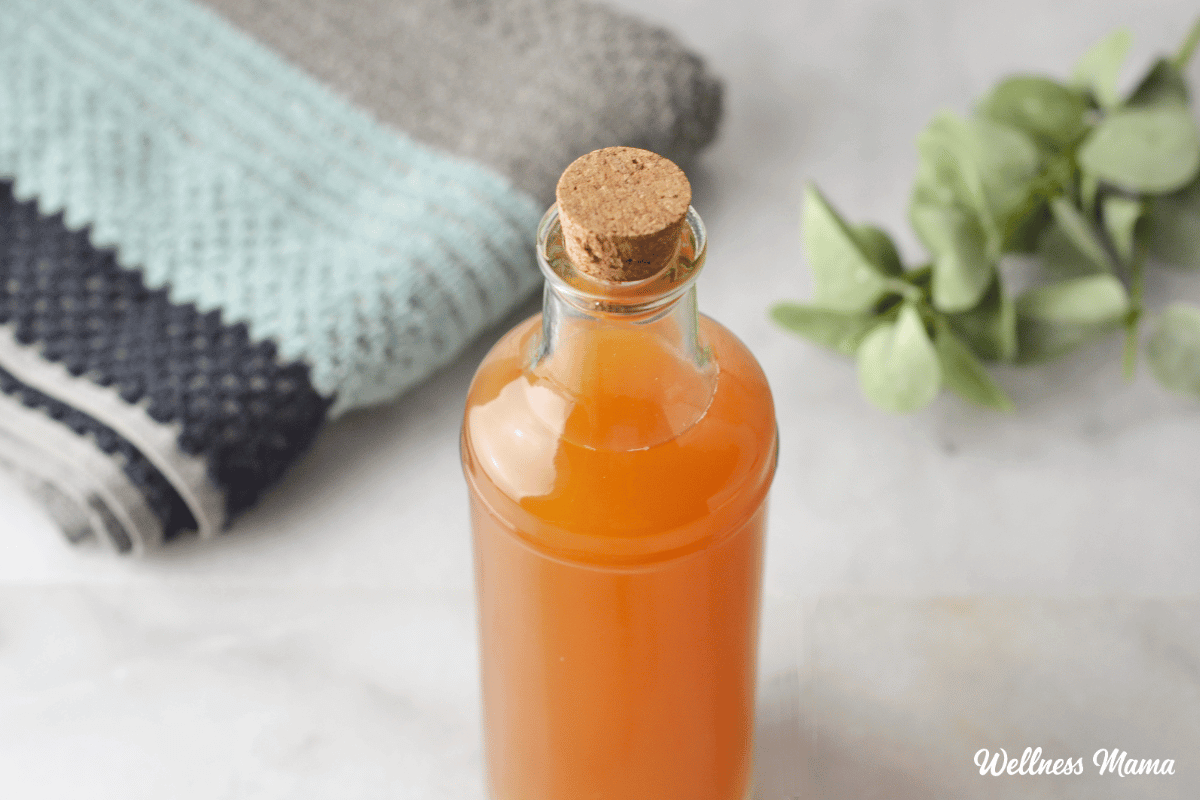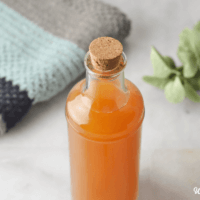Many types of baths are great for detox and relaxation. One of the simplest ones though is a DIY apple cider vinegar bath. They’re great for skincare and with just one ingredient, couldn’t be easier!
I’m not a fan of vinegar’s smell, but I am a huge fan of apple cider vinegar baths. They leave my skin and hair looking and feeling amazing.
Health Benefits of an ACV Bath
Apple Cider Vinegar is a versatile home remedy for healthy skin and a healthier body. You can infuse it with herbs for a natural cold remedy and health tonic, or sip on it to relieve heartburn.
Sprayed on the skin, it takes the sting out of sunburn and apple cider vinegar soaks help alleviate athlete’s foot. There are so many health benefits to using ACV, especially for skin health.
Vitamins and Minerals in Apple Cider Vinegar
Apple Cider Vinegar (ACV) is a natural source of B vitamins, vitamin C, and trace minerals, making it nourishing to the skin. ACV is made from apple juice and has a similar nutritional profile, including antioxidants. Fermented ACV with the “mother” culture is even richer in beneficial compounds.
More research is showing the link between ACV and weight loss and how it can help balance blood sugar and insulin levels. You can even get apple cider vinegar supplements or make your own gummies!
It’s possible we can get some of these nutrients by soaking in them since the skin is the body’s largest organ. Our skin barrier more readily absorbs fat-soluble vitamins though and ACV has water-soluble ones. Even if it’s not increasing internal nutrient levels when used in a detox bath, it still has skin benefits!
Beneficial Acids
Vinegar is naturally acidic so it helps restore the skin’s pH balance which should be slightly acidic. The pH balance of many soaps and skincare products is alkaline and disrupts the skin microbiome. Though it helps restore the skin’s pH it has an alkalizing effect internally and many use it for better digestion and as an acid reflux remedy.
Apple cider vinegar mainly contains acetic acid, but you’ll also find malic acid, citric acid, and others. They all perform slightly different functions and which ones are present depends on the type of apple used.
Also, many people with joint problems notice improvement from soaking in apple cider vinegar baths. ACV is a known anti-inflammatory both internally and topically. These beneficial acids and vitamins may be part of the reason.
Soothes Skin Problems
ACV can help naturally kill fungus and bacteria on the skin thanks to its antimicrobial properties. Its antifungal properties make it a great way to fight yeast infections, candida, and athlete’s foot. Researchers have used it to treat stubborn candida infections in the body, in the vaginal area, and even in the mouth.
For this reason, AVC baths are also sometimes recommended for urinary tract infections. The vinegar can help kill the yeast or fungus and create an environment where it’s difficult for infection to thrive.
Some people use ACV for relief of eczema (atopic dermatitis) and other skin conditions. A 2019 trial had people with eczema soak their arm in diluted ACV for 10 minutes a day. Those with sensitive skin noticed irritation and no one had significantly better skin after soaking. However, a 2016 animal study found that using an acidic acv cream helped prevent eczema patches from developing. By balancing the skin’s pH apple cider vinegar can help eczema prone skin stay healthier.
Healthcare experts often recommend vinegar for skin problems dandruff, and dry skin. These same antibacterial properties and beneficial acids make vinegar effective against zits. A tiny dab of ACV can often help reverse a zit overnight.
Reduce Body Odor
Body odor occurs when bacteria mix with sweat or moisture from the body and thrives in the warm moist environment. It especially loves hot places like the underarms. Apple cider vinegar helps kill bacteria and reduce odor. It also creates an environment where odor is less likely to thrive.
Various studies have looked at vinegar’s antibacterial effects and made some impressive discoveries. Not only can vinegar fight a variety of pathogens, but it also helps with resistant bacterial strains.
I haven’t personally tried it, but many people who can’t tolerate deodorants with baking soda dilute apple cider vinegar to use as a deodorant with great results. An armpit detox may also be helpful for those with body odor or irritated underarms.
DIY Apple Cider Vinegar Bath
Materials
- 2 cups apple cider vinegar (or reduce to 1 cup if preferred)
- 1 cup Epsom salt (optional)
Instructions
- Fill a tub with hot or warm water and add 1 to 2 cups of apple cider vinegar. Add Epsom salt if using.
- Soak for at least 20 minutes in the bath water. Make sure to get your hair wet too.
- You can leave the vinegar on the skin and towel dry or rinse off in cool water first.
Notes
Other Skin Uses for ACV
- As I mentioned, a tiny dab of ACV can often remedy a zit overnight
- I also use a diluted spray of apple cider vinegar (1 tablespoon in 1 cup of water) as a soothing facial toner
- You can use this same spray on the underarms for a natural deodorant. Some people find they need to increase the vinegar’s concentration for deodorant.
- Dab undiluted vinegar on toenail fungus or soak in a strong (50:50) solution of white or apple cider vinegar and water.
- Dab ACV on warts
- Rinse hair with 1/4 cup ACV in 1 cup water for shiny hair.
How do you use vinegar? Ever taken an apple cider vinegar bath?






Leave a Reply